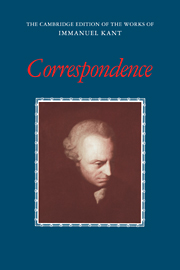Book contents
- Frontmatter
- Contents
- General Editors' Preface
- Acknowledgments
- Introduction
- Letters before 1770
- Letters 1770–1780
- 1770
- 1771
- 1772
- 1773
- 1774
- 1776
- 1777
- 1778
- 1779
- Letters 1781–1789
- Letters 1790–1794
- Letters 1795–1800
- Public Declaration concerning Fichte's Wissenschaftslehre, August 7, 1799
- Biographical Sketches
- Glossary
- Index of Persons
1779
from Letters 1770–1780
Published online by Cambridge University Press: 07 September 2010
- Frontmatter
- Contents
- General Editors' Preface
- Acknowledgments
- Introduction
- Letters before 1770
- Letters 1770–1780
- 1770
- 1771
- 1772
- 1773
- 1774
- 1776
- 1777
- 1778
- 1779
- Letters 1781–1789
- Letters 1790–1794
- Letters 1795–1800
- Public Declaration concerning Fichte's Wissenschaftslehre, August 7, 1799
- Biographical Sketches
- Glossary
- Index of Persons
Summary
Dear Sir,
Worthiest friend,
I received your kind gift, the plaster cast of Herr Mendelssohn's medallion, via Herr von Nolte, a pleasant young gentleman, and I thank you for it.
Dr. Heintz assures me, through letters from Secretary Biester, that your lectures have been received with unusual and universal applause. Now Herr Kraus tells me exactly the same thing and informs me of the thoroughgoing respect you have earned from the Berlin public. I need not assure you of the exceptional pleasure that this evokes in me; it is obvious. What is unexpected in this is not your astuteness and insight, which I already have cause to believe in completely, but the popularity you have achieved that, in a project of this sort, would have made me fearful. For some time I have been reflecting in idle moments on the principles needed to achieve popularity in the sciences generally (obviously I mean sciences that are capable of popularity, for mathematics is not), especially in philosophy, and I think that from this perspective I can not only describe a different selection but also a wholly different organization than the methodical, scholastic one that always remains fundamental requires. However, your success shows that you have the knack for this even in your first attempts.
How I wish I had a better manuscript to give you than the one Herr Kraus will deliver to you.
- Type
- Chapter
- Information
- Correspondence , pp. 173 - 176Publisher: Cambridge University PressPrint publication year: 1999



